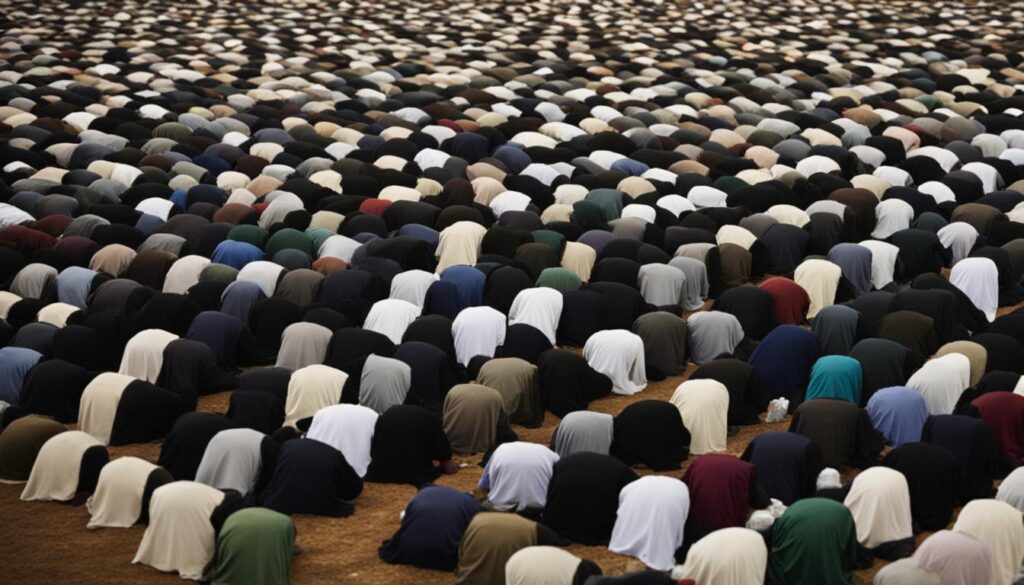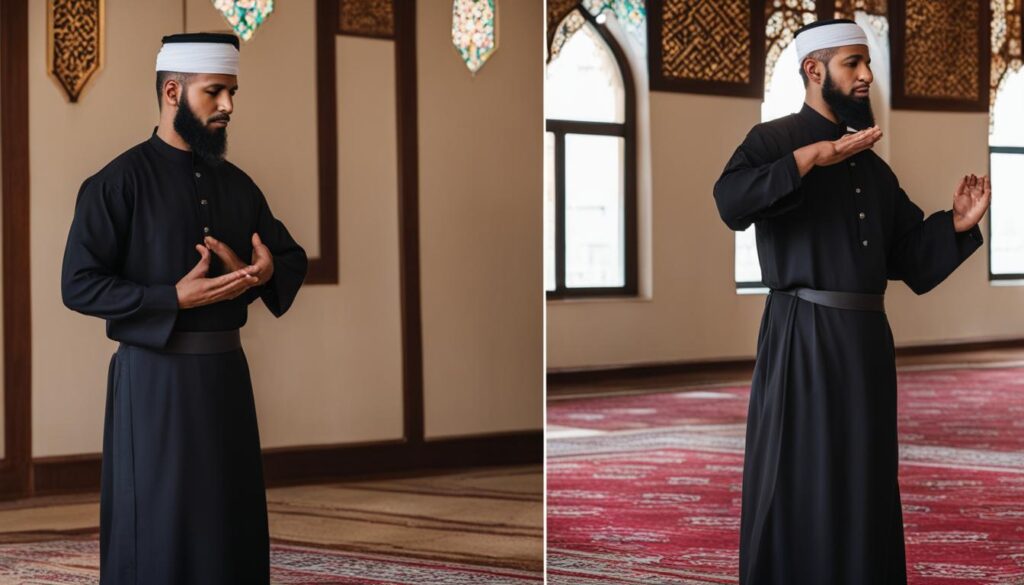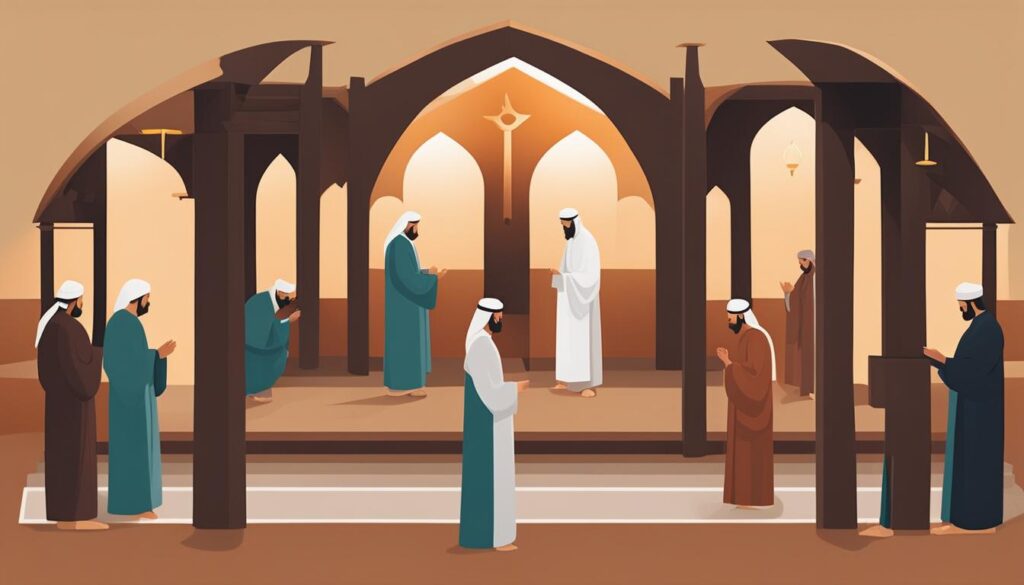The Janazah prayer is an important part of Islamic funeral rites. It is a solemn prayer performed to bid farewell to a deceased Muslim and seek forgiveness and mercy for them. The prayer is to be performed in a specific manner, following a set of steps and guidelines. In this guide, we will provide a detailed explanation of how to pray Janazah, ensuring that you have the correct knowledge and understanding to perform this important prayer correctly.
Key Takeaways:
- Praying the Janazah prayer is a communal obligation for Muslims.
- Preparing for the prayer involves performing Wudu and facing the Qiblah.
- The prayer consists of four Takbeer accompanied by specific actions.
- Adhering to rules and etiquette is important during the Janazah prayer.
- Offering condolences and support to the bereaved family is essential.
The Significance of Janazah Prayer in Islam
The Janazah prayer holds great significance in Islam. It is considered a communal obligation (Fard Kafayah) for Muslims to perform this prayer for a deceased Muslim. By offering the Janazah prayer, Muslims bid farewell to their loved ones, fulfill their religious duty, and seek forgiveness and mercy for the deceased. The funeral prayer in Islam serves as a reminder of the inevitability of death and the need to prepare for the hereafter.
The Janazah prayer is an essential part of Islamic burial rituals. It is a solemn and sacred act of worship that brings the Muslim community together to honor and remember the deceased. Through this prayer, Muslims express their faith and belief in the afterlife, offering supplications and seeking forgiveness for the departed soul. It is a way to show respect and compassion for the deceased and a means of finding solace and comfort in the midst of grief.
In Islamic tradition, performing the Janazah prayer is not only a religious duty but also a way to earn rewards and blessings from Allah. The Prophet Muhammad (PBUH) emphasized the importance of attending funeral prayers and accompanying the deceased until burial, stating that these acts are greatly rewarded. By fulfilling this communal obligation, Muslims have the opportunity to earn immense spiritual benefits and gain closeness to Allah.
| Benefits of Janazah Prayer |
|---|
| 1. Fulfilling religious duty |
| 2. Seeking forgiveness and mercy for the deceased |
| 3. Expressing faith in the afterlife |
| 4. Finding solace and comfort in times of grief |
| 5. Earning rewards and blessings from Allah |
The Importance of Janazah Prayer:
“Verily, when the believer is leaving this world and entering the Hereafter, angels with faces as bright as the sun descend upon them. They carry with them a shroud from Paradise and embalmment from the fragrance of Paradise. They sit away from him as far as the eye can see. Then the angel of death comes and sits at the head of the dying person and says, ‘O pure soul, come out to forgiveness and good pleasure from Allah.’ Then it comes out as a drop of water flows from the mouth of a water skin.”
The Janazah prayer is a sacred ritual that holds deep spiritual and emotional significance for Muslims. It is a way to honor the deceased, fulfill religious obligations, and seek blessings from Allah. By understanding the importance of the Janazah prayer, Muslims can approach this solemn act of worship with reverence and devotion.

Preparing for Janazah Prayer
Before performing the Janazah prayer, it is important to make the necessary preparations. This ensures that the prayer is conducted with the required reverence and adherence to Islamic traditions. Here are the steps to prepare for the Janazah prayer:
- Perform Wudu: Begin by performing ablution (Wudu) to cleanse yourself spiritually. This involves washing your hands, mouth, nose, face, arms, and feet.
- Face the Qiblah: Position yourself facing the Qiblah, the direction of the Ka’bah in Mecca. This symbolizes the unity of the Muslim community in worship.
- Preparation of the deceased: Ensure that the body of the deceased has been prepared according to Islamic customs. This includes washing, shrouding, and placing the deceased in front of the congregation.
- Stand in rows: Stand in rows behind the Imam, maintaining a straight line and shoulder-to-shoulder formation. This signifies the unity and equality of the worshippers.
By following these steps, you can ensure that you are ready to perform the Janazah prayer in a proper and respectful manner. It is important to approach this prayer with sincerity and a desire to seek forgiveness and mercy for the deceased.

Table: Positions Based on Gender of the Deceased
| Position | Males | Females |
|---|---|---|
| 1st Row | Immediate male family members | Immediate female family members |
| 2nd Row | Other males | Other females |
| 3rd Row | Non-Muslim males | Non-Muslim females |
The table above illustrates the position in which each group should stand during the Janazah prayer based on the gender of the deceased. This arrangement ensures a respectful separation and allows for the proper observance of Islamic funeral rituals.
Step-by-Step Guide to Praying Janazah
The Janazah prayer is a simple and solemn prayer that follows a specific set of steps. By understanding and following these steps, Muslims can ensure that they perform the Janazah prayer correctly and with the utmost reverence. Let’s explore the step-by-step guide to praying Janazah.
Step 1: Begin with the First Takbeer
Start by raising your hands to the level of your shoulders and say “Allahu Akbar” (Allah is Greater) silently. This is known as the first Takbeer.
Step 2: Recite the Opening Supplication
After the first Takbeer, recite the opening supplication silently. You can say: “Subhanaka Allahumma wa bi hamdika, wa tabarakasmuka, wa ta’ala jadduka, wa la ilaha ghairuka.” (Glory be to You, O Allah, and all praise is for You. Blessed is Your name and exalted is Your Majesty. There is no deity worthy of worship except You.)
Step 3: Perform the Second and Third Takbeer
After the opening supplication, raise your hands to the level of your shoulders again and say “Allahu Akbar” silently. This is the second Takbeer. Then, fold your hands below your navel and recite a specific supplication silently. Repeat this step for the third Takbeer.
Step 4: Offer Blessings upon the Prophet Muhammad (PBUH)
Upon completing the third Takbeer, raise your hands to the level of your shoulders one last time and say “Allahu Akbar” silently. Then, recite the following supplication silently: “Allahumma salli ala Muhammadin wa ala aali Muhammadin, kama sallayta ala Ibraheema wa ala aali Ibraheema, innaka hameedun Majeed. Allahumma barik ala Muhammadin wa ala aali Muhammadin, kama barakta ala Ibraheema wa ala aali Ibraheema, innaka hameedun Majeed.” (O Allah, send blessings upon Muhammad and the family of Muhammad, as You sent blessings upon Ibrahim and the family of Ibrahim. Verily, You are Praiseworthy and Glorious. O Allah, bless Muhammad and the family of Muhammad, as You blessed Ibrahim and the family of Ibrahim. Verily, You are Praiseworthy and Glorious.)
“The Janazah prayer is a simple and solemn prayer that follows a specific set of steps.”
After offering the blessings upon the Prophet Muhammad (PBUH), the Imam will conclude the Janazah prayer by saying the greeting of peace, “As-salamu alaykum wa rahmatullah.” The congregation should turn their heads to the right and say the same greeting.
By following these step-by-step guidelines, Muslims can perform the Janazah prayer with the proper reverence and fulfill their religious obligations. It is important to remember that the Janazah prayer is a communal obligation, and by performing it, we honor the deceased and seek forgiveness and mercy for them.
Rules and Etiquette of Janazah Prayer
In order to perform the Janazah prayer with the utmost reverence, it is important to adhere to certain rules and etiquette. These guidelines ensure that the prayer is conducted in a respectful manner and that all participants can fully engage in the spiritual experience. Here are some key rules and etiquette to keep in mind when performing the Janazah prayer:
1. Standing in Straight Rows
When gathering for the Janazah prayer, it is essential for participants to stand in straight rows, shoulder to shoulder, and feet to feet. This symbolizes unity and equality among the worshippers, emphasizing the importance of community in Islamic rituals.
2. Raising Hands with Each Takbeer
During the Janazah prayer, it is recommended to raise the hands with each Takbeer, the proclamation of “Allahu Akbar” (Allah is Greater). This gesture signifies submission and humility before Allah, as well as the acknowledgement of His greatness.
3. Reciting Supplications Silently
While performing the Janazah prayer, it is customary to recite specific supplications silently. This allows individuals to focus on their connection with Allah and their intentions for the deceased, without being distracted by external sounds.
4. Following the Imam’s Lead
The Imam, the leader of the prayer, plays a crucial role in guiding the congregation during the Janazah prayer. It is important for participants to closely follow the Imam’s lead, observing their movements and actions throughout the prayer.
By observing these rules and etiquette, Muslims can ensure that the Janazah prayer is performed with the utmost reverence and sincerity. This allows for a meaningful spiritual experience and a proper farewell to the deceased.

Table: Key Rules and Etiquette of Janazah Prayer
| Rule/Etiquette | Description |
|---|---|
| Standing in Straight Rows | Participants should stand in straight rows, shoulder to shoulder, and feet to feet, symbolizing unity and equality. |
| Raising Hands with Each Takbeer | It is recommended to raise the hands with each Takbeer, signifying submission and humility before Allah. |
| Reciting Supplications Silently | Participants should recite specific supplications silently, allowing for focused connection with Allah. |
| Following the Imam’s Lead | It is important to closely follow the movements and actions of the Imam, the leader of the prayer. |
Special Cases in Janazah Prayer
The Janazah prayer, while following a general set of steps and guidelines, may have slight variations depending on certain circumstances. It is essential to be aware of these special cases and to follow the appropriate protocols when performing the Janazah prayer for different situations. Here are some examples of special cases that may arise:
1. Janazah Prayer for a Miscarried Fetus
In the case of a miscarried fetus, the funeral prayer may be performed with specific prayers and supplications. While the general structure of the Janazah prayer remains the same, there are additional considerations and intentions to be made for the soul of the unborn baby.
2. Janazah Prayer for Children
When performing the Janazah prayer for a child, there are additional prayers and blessings offered. These prayers seek forgiveness and mercy for the young soul, recognizing their innocence and the importance of their place in the hereafter.
3. Janazah Prayer for Martyrs
In the case of a martyr, someone who has died while defending their faith, there are specific prayers and blessings to be offered during the Janazah prayer. These prayers honor their sacrifice and express gratitude for their commitment to Islam.
| Situation | Special Considerations |
|---|---|
| Miscarried Fetus | Specific prayers and supplications for the soul of the unborn baby. |
| Children | Additional prayers and blessings to seek forgiveness and mercy for the young soul. |
| Martyrs | Specific prayers and blessings to honor their sacrifice and express gratitude for their commitment to Islam. |
Mourning the Deceased and Offering Condolences
In addition to performing the Janazah prayer, it is also important to offer condolences and support to the family of the deceased. Mourning the loss of a loved one is an integral part of the grieving process in Islam. This includes offering sincere words of comfort and support, providing assistance to the bereaved family, and participating in funeral rituals such as visiting the cemetery.
When offering condolences, it is important to choose your words carefully and speak from the heart. Expressing sympathy and offering prayers for the deceased and their family can provide solace during this difficult time. Remember that grief is a personal experience, and everyone mourns in their own way. Be respectful of the family’s wishes and customs, and offer support in whatever ways are most meaningful to them.
Visiting the cemetery after the Janazah prayer is a way to pay respects to the deceased and offer prayers for their journey in the afterlife. It is a time to reflect on life’s impermanence and the importance of preparing for the hereafter. Visiting the gravesite can also provide closure for the bereaved, allowing them to find solace and peace in the final resting place of their loved one.
During this time of mourning, it is important to offer support not only through words, but also through actions. Providing meals, helping with household chores, or simply being there to listen can make a world of difference to a grieving family. It is through these acts of kindness and compassion that we can truly embody the spirit of Islamic funeral prayers and support those who are mourning.
Rewards and Blessings of Janazah Prayer
The Janazah prayer holds immense rewards and blessings for those who perform it. It is considered a communal obligation (Fard Kafayah) in Islam, and by fulfilling this duty, Muslims have the opportunity to earn immense spiritual benefits and gain closeness to Allah.
The rewards and blessings of the Janazah prayer are emphasized in the teachings of the Prophet Muhammad (PBUH). He said, “Whoever attends the funeral prayer and accompanies the deceased until burial, he will have two Qirats of reward, and each Qirat is like the size of Mount Uhud in this world.”[1]
This powerful statement highlights the magnitude of blessings that can be attained by fulfilling this important obligation. It serves as a reminder of the significance of the Janazah prayer in Islam and the impact it can have on the spiritual journey of a Muslim.
“The rights of the deceased upon the living are five: to follow his funeral procession, to pray the Janazah prayer for him, to accompany him to his grave, to supplicate for mercy upon him, and to remain patient and comforting to his family until they bury him.”[2]
By performing the Janazah prayer and fulfilling the rights of the deceased, Muslims actively participate in the farewell process, seeking forgiveness and mercy for the departed soul. It is a selfless act of compassion and a demonstration of solidarity with the grieving family, providing comfort and support during their time of loss.
Rewards and Blessings of Janazah Prayer:
| Rewards | Blessings |
|---|---|
| Earn two Qirats of reward for attending the funeral prayer and accompanying the deceased until burial | Gain immense spiritual benefits |
| Each Qirat is like the size of Mount Uhud in this world | Draw closer to Allah |
| Seek forgiveness and mercy for the deceased | |
| Participate in the farewell process | |
| Show compassion and support to the grieving family |
References:
- Hadith – Sahih Muslim
- Hadith – Sunan Ibn Majah
Conclusion
The Janazah prayer is an essential part of Islamic funeral rites. It is a solemn prayer that allows Muslims to fulfill their religious obligations and bid farewell to their loved ones. By following the step-by-step guide and adhering to the rules and etiquette of the Janazah prayer, Muslims can ensure that they perform this important prayer correctly and with the utmost reverence.
This prayer holds great significance in Islam, serving as a communal obligation for Muslims to offer for a deceased Muslim. It provides an opportunity to seek forgiveness and mercy for the departed soul and serves as a reminder of the temporary nature of life. By performing the Janazah prayer, Muslims can honor the deceased and prepare themselves for the hereafter.
It is important to remember that in addition to the Janazah prayer, offering condolences and support to the family of the deceased is also a crucial part of the grieving process in Islam. Mourning the loss of a loved one and participating in funeral rituals are acts of compassion and solidarity that should be embraced.
In conclusion, the Janazah prayer allows Muslims to fulfill their religious obligations, seek forgiveness and mercy for the deceased, and prepare for the hereafter. By understanding the steps, rules, and etiquette of this prayer, Muslims can ensure that they perform it correctly and with reverence.
FAQ
What is the Janazah prayer?
The Janazah prayer is an important part of Islamic funeral rites. It is a solemn prayer performed to bid farewell to a deceased Muslim and seek forgiveness and mercy for them.
Why is the Janazah prayer significant in Islam?
The Janazah prayer is considered a communal obligation (Fard Kafayah) for Muslims. It allows them to fulfill their religious duty, bid farewell to their loved ones, and seek forgiveness and mercy for the deceased.
How do I prepare for the Janazah prayer?
Before performing the Janazah prayer, ensure that you have performed Wudu (ablution) and face the Qiblah (the direction of the Ka’bah in Mecca). The body of the deceased should be washed, shrouded, and placed in front of the congregation.
What are the steps to praying Janazah?
The Janazah prayer consists of four Takbeer, each accompanied by specific actions such as raising the hands, reciting supplications, and offering blessings upon the Prophet Muhammad (PBUH). The Imam leads the prayer, and the congregation follows along.
What are the rules and etiquette of the Janazah prayer?
It is important to stand in straight rows, shoulder to shoulder, and feet to feet. Raising the hands with each Takbeer and reciting specific supplications silently are recommended. Following the Imam’s lead and maintaining focus and reverence throughout the prayer are also essential.
Are there any special cases in the Janazah prayer?
Yes, there are specific prayers and supplications for cases such as a miscarried fetus, children, and martyrs. It is important to follow the appropriate protocols when performing the Janazah prayer for different situations.
How can I offer condolences and support to the family of the deceased?
Mourning the loss of a loved one is an integral part of the grieving process in Islam. Offer sincere words of comfort and support, provide assistance to the bereaved family, and participate in funeral rituals such as visiting the cemetery.
What are the rewards and blessings of the Janazah prayer?
The Prophet Muhammad (PBUH) said that attending the funeral prayer and accompanying the deceased until burial are greatly rewarded acts. By performing the Janazah prayer, Muslims have the opportunity to earn immense spiritual benefits and gain closeness to Allah.
How does the Janazah prayer fit into Islamic funeral rites?
The Janazah prayer is an essential part of Islamic funeral rites. It allows Muslims to fulfill their religious obligations, bid farewell to their loved ones, and seek forgiveness and mercy for the deceased.








